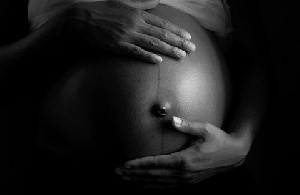For pregnant Miss P, a 19 year old student at a university in Accra, “the emotional trauma is unbearable”.
“I had a relationship with a guy for a year. He got me pregnant and wanted me to abort it. I tried, but was unsuccessful. My parents suspected my condition and took me to the hospital for a check-up, it was positive,” narrated Miss P at her residence in Accra. “I’m carrying a six month baby for a guy I loved dearly. My parents have decided that, I will give birth but will not give the baby to him. After hearing this the pain felt as if I owed the world a million dollars just because I’m a teenager carrying a baby.”
Miss P, who lives with her parents, is expecting to deliver her baby in January.
When we met her on 15 October, she had just returned from a lecture; she hopes to become a “seasoned” beautician.
During previous eras, teenagers who got pregnant in certain cultures were banished from the town with their partners and were made to pay a heavy price for their abomination.
Ken Saro-Wiwa recounts in Home Sweet Home that when the dutiful lady student returned to Dukana, and enquired of Sira, her best female friend who could not continue her schooling beyond the village, she was met with sounds of silence and rumours since her friend had given birth without having married and was now sojourning across the river due to shame.
But here is Miss P, living in a modern city, with access to university education, and again pregnant and still traumatised.
We would have readily assumed that for Miss P, living in Accra, and being a university student, knowledge of contraceptives should come easy.
But of course, knowledge and the willingness to act upon the knowledge are two different things.
In a story published on 30 July 2019 on ctvnews.ca “New US research has found that parents talking to their children about sex and contraception appears to encourage teens to engage in safer sexual activity.”
The ctv.ca story quoted Laura Widman, first author of the paper published in the journal JAMA Pediatrics, on their study which “analyzed 31 randomized controlled trials, involving a total of 12,464 adolescents between the ages of 9 and 18” and found “that interventions appeared to have a positive effect on teens’ sexual behavior and health by increasing condom use and improving parent-child sexual communication.”
Miss P did not benefit from such interventions at “age 14 or younger”.
Can we infer that the results of the US study are applicable in Ghana?
Today like the village girl in Dukana, she is only met with unhelpful comments describing her as “dysfunctional and immoral”.
Who is the victim here: Miss P or her parents? And who do we label as the persecutor?
The International Conference on Population and Development (ICPD25), which ended in Nairobi on 14 November, has highlighted another group of victims and persecutors.
At the conference some 200 organisations scattered over 50 nations called for “full access to information, means and support for any woman who wants an abortion, guaranteed universal health coverage, bodily autonomy, and a recognition that access to the full range of sexual and reproductive health and rights” is “the bedrock of gender equality,’ reported theguardian.com on 14 November, 2019.
Consequently, both potential victims and persecutors need knowledge and information to “discover their own truths and to arrive closer to the truth,” as our mentor will say.
Meanwhile, in Ghana, our two main political parties have both clandestinely introduced and withdrawn documents on the proposed “Comprehensive Sexuality Education” making all of us potential needless victims and persecutors.
Feedback; to Desmond via WhatsApp on 057 001 5253 or to ato@writersghana.com; www.writersghana.com; LinkedIn, Isaac Ato Mensah; Instagram, @atomenswriters; Twitter, @Atomens; Facebook, Writers and Shakespeares Ghana; Telegram, Isaac Ato Mensah; Quora, Isaac Ato Mensah. WhatsApp (+233) 020 022 0353.
Writers and Shakespeares Ghana Limited exist to be a moral and intellectual guide to the best practice of PR and integrated communications around the world, beginning with Ghana.
Opinions of Friday, 22 November 2019
Columnist: Isaac Ato Mensah



















